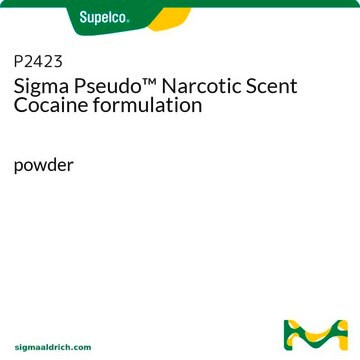C1528
Cocaine hydrochloride solution
1.0 mg/mL in methanol, analytical standard, for drug analysis
About This Item
Produits recommandés
Qualité
analytical standard, for drug analysis
Niveau de qualité
drug control
Home Office Schedule 2; stupéfiant (France); kontrollierte Droge in Deutschland; (Spain); Decreto Lei 15/93: Tabela IB (Portugal)
Concentration
1.0 mg/mL in methanol
Technique(s)
HPLC: suitable
gas chromatography (GC): suitable
Application(s)
pharmaceutical (small molecule)
Format
single component solution
Température de stockage
2-8°C
Chaîne SMILES
Cl.COC(=O)[C@H]1[C@H](C[C@@H]2CC[C@H]1N2C)OC(=O)c3ccccc3
InChI
1S/C17H21NO4.ClH/c1-18-12-8-9-13(18)15(17(20)21-2)14(10-12)22-16(19)11-6-4-3-5-7-11;/h3-7,12-15H,8-10H2,1-2H3;1H/t12-,13+,14-,15+;/m0./s1
Clé InChI
PIQVDUKEQYOJNR-VZXSFKIWSA-N
Vous recherchez des produits similaires ? Visite Guide de comparaison des produits
Catégories apparentées
Description générale
Application
Autres remarques
Mention d'avertissement
Danger
Mentions de danger
Conseils de prudence
Classification des risques
Acute Tox. 3 Dermal - Acute Tox. 3 Inhalation - Acute Tox. 3 Oral - Flam. Liq. 2 - STOT SE 1
Organes cibles
Eyes,Central nervous system
Code de la classe de stockage
3 - Flammable liquids
Classe de danger pour l'eau (WGK)
WGK 2
Point d'éclair (°F)
51.8 °F - closed cup
Point d'éclair (°C)
11 °C - closed cup
Équipement de protection individuelle
Eyeshields, Faceshields, Gloves, type ABEK (EN14387) respirator filter
Faites votre choix parmi les versions les plus récentes :
Certificats d'analyse (COA)
Vous ne trouvez pas la bonne version ?
Si vous avez besoin d'une version particulière, vous pouvez rechercher un certificat spécifique par le numéro de lot.
Déjà en possession de ce produit ?
Retrouvez la documentation relative aux produits que vous avez récemment achetés dans la Bibliothèque de documents.
Protocoles
Analytical standards for drug analysis including heroin, cocaine, amphetamine, and methylenedioxymethamphetamine.
Analytical standards for drug analysis including heroin, cocaine, amphetamine, and methylenedioxymethamphetamine.
Analytical standards for drug analysis including heroin, cocaine, amphetamine, and methylenedioxymethamphetamine.
Analytical standards for drug analysis including heroin, cocaine, amphetamine, and methylenedioxymethamphetamine.
Notre équipe de scientifiques dispose d'une expérience dans tous les secteurs de la recherche, notamment en sciences de la vie, science des matériaux, synthèse chimique, chromatographie, analyse et dans de nombreux autres domaines..
Contacter notre Service technique









